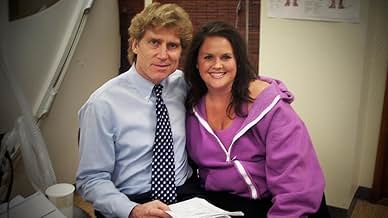Cuerpos de TV: La realidad de the Biggest Loser
Título original: Fit for TV: The Reality of the Biggest Loser
Una mirada entre bastidores del exitoso concurso de telerrealidad, revelando lo bueno, lo malo y lo complejo.Una mirada entre bastidores del exitoso concurso de telerrealidad, revelando lo bueno, lo malo y lo complejo.Una mirada entre bastidores del exitoso concurso de telerrealidad, revelando lo bueno, lo malo y lo complejo.
Explorar episodios
Opiniones destacadas
I found it interesting and watched all 3 episodes. However as others have said, too many stories of people trying to play the victim. Yes, there was corporate greed from the producers, but that's pretty much how the world works. Everyone who went on the show after season 2, knew what they were signing up for. It's just sad that most of the people didn't take the lessons learned and gained all the weight back.
I watched The Biggest Loser with my wife at the time. Good grief, anyone who had watched the first season knew EXACTLY what they were getting themselves into. They'd seen Bob and Jillian get up in the faces of the contestants, and raise their voices as part of the motivation. ANYONE who was involved in team sports in high school has endured far worse than that. Joelle seemed to lock herself into a power struggle with her coach. She deliberately held back during training sessions as a way of holding onto that little bit of control. Her negative experiences on TBL seem to be rooted in the fact that her personality was completely unsuited for the show. Crying that there isn't "aftercare" for contestants after the show is the most entitled nonsense. Grow up. The program helped you lose a large amount of weight, it's on you to change your life if you want to keep it off. Caffeine as a scandal? C'mon.
Honestly it was insufferable seeing Bob Harper and the producers acting as if they did mostly good things and not take any accountability for anything they made these poor people go through.
Anyone trying to lose weight should always exercise at their own pace and obviously should not be made to work out until they throw up and the fact that anyone thought this was okay is wild to me but maybe not too surprising as society does seem to hate fat people and that fact that a show like "The Biggest Loser" was ever a thing proves it.
I wish nothing but the worst for not only Bob Harper and the producers but everyone blaming the contestant in the reviews, still i'm glad that this documentary exists and i hope it opened some people' eyes if they didn't know about this already.
Anyone trying to lose weight should always exercise at their own pace and obviously should not be made to work out until they throw up and the fact that anyone thought this was okay is wild to me but maybe not too surprising as society does seem to hate fat people and that fact that a show like "The Biggest Loser" was ever a thing proves it.
I wish nothing but the worst for not only Bob Harper and the producers but everyone blaming the contestant in the reviews, still i'm glad that this documentary exists and i hope it opened some people' eyes if they didn't know about this already.
I think this is less a documentary and more a self-aggrandizing recount of a long-running reality television series. Even the (tacit and semi-overt) "admissions" regarding negative health outcomes for some participants just didn't justify the length of time required to watch this offering. I fear it just didn't break any new ground about this topic.
It was a fascinating watch, but I'm not sure it really went anywhere. There was no solid finding or conclusion-just a range of opinions. So, not a great ending.
For me, however, there were some takeaways:
1. The treatment of the woman with rhabdomyolysis was appalling. If her allegations are true, she is owed at least an apology from the trainers and producers-possibly more. It's a reminder that very few people truly understand rhabdo.
2. The Biggest Loser was always about entertainment and money. It was a mistake to think otherwise.
3. The doctor seemed like a good guy. I only wish he had been more outspoken.
4. Weight loss isn't achieved by exercise-it's about calorie deficit. As Bob acknowledged, the exercise was largely for show. At the same time, too steep a calorie deficit is dangerous and unhealthy in the long term. The trainers should have known better.
5. There was definitely some fat-shaming. And some of what the trainers did crossed the line.
For me, however, there were some takeaways:
1. The treatment of the woman with rhabdomyolysis was appalling. If her allegations are true, she is owed at least an apology from the trainers and producers-possibly more. It's a reminder that very few people truly understand rhabdo.
2. The Biggest Loser was always about entertainment and money. It was a mistake to think otherwise.
3. The doctor seemed like a good guy. I only wish he had been more outspoken.
4. Weight loss isn't achieved by exercise-it's about calorie deficit. As Bob acknowledged, the exercise was largely for show. At the same time, too steep a calorie deficit is dangerous and unhealthy in the long term. The trainers should have known better.
5. There was definitely some fat-shaming. And some of what the trainers did crossed the line.
Selecciones populares
Inicia sesión para calificar y agrega a la lista de videos para obtener recomendaciones personalizadas
Detalles
- Fecha de lanzamiento
- País de origen
- Idioma
- También se conoce como
- Fit for TV: The Reality of the Biggest Loser
- Productora
- Ver más créditos de la compañía en IMDbPro
- Tiempo de ejecución
- 2h 4min(124 min)
- Color
Contribuir a esta página
Sugiere una edición o agrega el contenido que falta

































